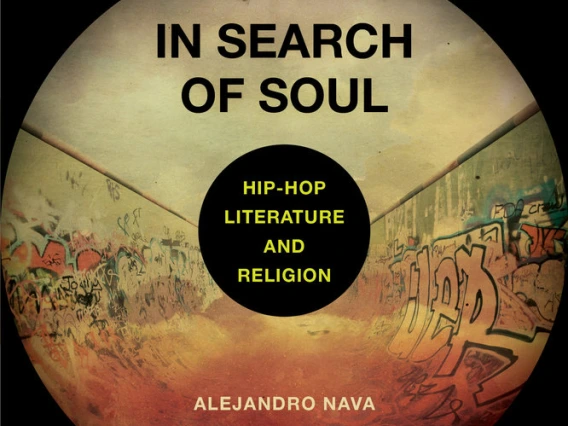
In a new book, UA professor Alejandro Nava explores the concept of "soul" from two major perspectives: the religious traditions of Judaism and Christianity, as well as the context of contemporary music and culture.
"In Search of Soul: Hip-Hop, Literature and Religion," published this month by the University of California Press, discusses the work of both traditional and contemporary writers, artists and thinkers, showing how the concept of "soul" revolves around narratives of justice, liberation and spiritual redemption.
"As a student of religion, I was particularly intrigued by rappers who would wantonly crisscross the categories of the sacred and profane," Nava writes in the introduction. "One side of their souls was rooted in the brute realities of urban life and the other half soared high above the mundane."
As both a religious concept and a cultural phenomenon, the term "soul" connotes authenticity, the central essence of a person.
"This book was motivated by a desire to explore the different nuances in the meaning of soul, particularly its sacred and profane dimensions, and to consider the pressures of money, power and greed that can tarnish the highest ideals associated with the values of the soul," says Nava, a professor of religious studies. "You can say that it's a response to a famous adage, by Jesus: 'What does it profit a man if he gains the whole world and loses his soul?'"
The book is organized in two parts — "Sacred Histories of the Soul" and "Profane Accents of Soul" — but seeks to explain what is common to both, commenting on universal themes of struggle, hope and resistance to injustice and oppression. The connections between the sacred, religious soul and the profane, artistic soul are myriad and emerge across different eras, Nava argues.
"In this second inflection, the meaning of 'soul' has been connected to a particular flair and grace that inspires the best musicians and artists," Nava says. "The phenomenon of soul as an artistic manifestation was deeply tied to civil rights and the black power movement. It was a critique of mainstream culture. Hip-hop adapted that orientation of criticizing mainstream society and the tendency to exclude and marginalize black communities in the United States."
Dyson's 'On God and Hip-Hop'
Born and raised in Tucson, Nava grew up listening to hip-hop music. As a graduate student in religion at the University of Chicago in the 1990s, he first began to consider the intersection of religion and hip-hop. Nava writes that a formative experience was hearing a talk by Michael Eric Dyson, then relatively unknown but now a sociologist and acclaimed author.
"I stumbled into a lecture where the title was the provocative 'On God and Hip-Hop,'" Nava says. "It was very powerful. I was studying religion at the time, but I really didn't see any intersection between hip-hop and religion. (Dyson) was the first to get me to think about the spiritual dimensions of the music. I started to pay more careful attention to the lyrics and to see more of the religious influence, in terms of Islam, Christianity and this unorthodox spirituality."
Hip-hop's connection to gospel, blues and jazz showed how contemporary culture was modifying the form but reflecting on the same enduring themes, Nava says. Having developed out of those earlier forms of black music, hip-hop established a link and bond with R&B, jazz, soul and funk by sampling — while at the same time introducing new narratives, themes and idioms.
"One major contribution in this area concerns hip-hop's bold exploration of ghetto life in the late 20th century," he says. "I really do see hip-hop as belonging to a continuum that started with the early forms of black music that came out of circumstances of oppression, discrimination and poverty. These forms of music became the voice of the struggles of those communities. Hip-hop has given voice to the underground struggles of millions in the United States and throughout the world. It is a ghetto-centric language for the poor of the world."
Relating his personal history with the music helped Nava balance his scholarly writing on the subject, enabling the book to reach out to an academic audience as well as hip-hop enthusiasts.
"'I've really tried to write for both audiences," Nava says. "I've been increasingly disappointed with academic books that only speak to other academics. With this, I intended to incorporate personal anecdotes from my life, my attraction to hip-hop and how that led me to this side of the music. Part of what helped me a lot was my classroom experience. This is how teaching helps a scholar to begin to write more creatively. You realize in the classroom what approach can reach a broader audience."
Reaching Broader Audiences
Having taught classes on hip-hop for a decade, including "Rap, Culture and God," Nava has honed his ability to connect with broader audiences, merging the scholarly and academic quality of the work with a more creative style and voice.
"Students are interested in what personally brings faculty members to their disciplines. Those stories resonate," he says.
There's a variety and range to hip-hop, some of which is grounded in socially conscious motivations and some of which can seem to be merely festive or celebratory. But spiritual inflections and influence can be found more often than not. Even the most popular and critically acclaimed contemporary rappers, such as Kendrick Lamar and Chance the Rapper, display a spiritual side.
"In my classes, I've tended shy away from rappers officially tagged as Christian rappers," Nava says. "I'm more interested in those who are more subtle and nuanced with their spirituality and religious perspective, who show a sincere quest to make sense of God in the circumstances of suffering. Those come across as more complex and interesting.
"You can't generalize hip-hop as any one voice, any one thing."

